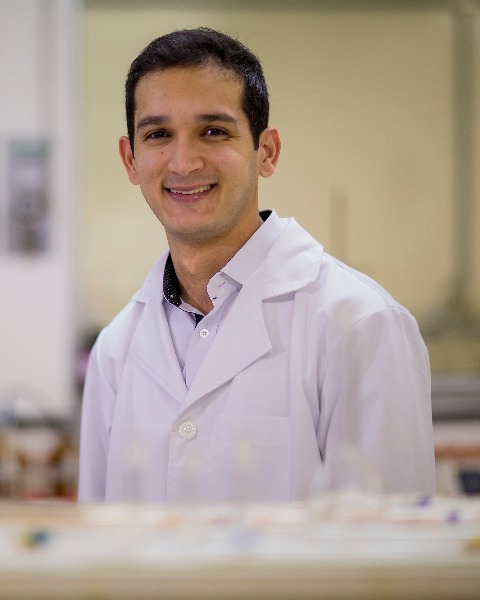Screening Applications & Diagnostics
Poster Session A
(1014-A) 3D printed devices toward food application: voltammetric detection and monitoring of photodegradation of folic acid in juice samples
Tuesday, May 28, 2024
16:30 - 17:15 CEST
Location: Exhibit Hall

Habdias A. Silva Neto, Habdias A. Silva-Neto
PhD student of chemistry
Federal University of Minas Gerais
Goiânia, Minas Gerais, Brazil
Poster Presenter(s)
Abstract: In this study, we fabricate compact 3D-printed carbon black (CB) electrodes embedded on polylactic acid
(PLA) thermoplastic and introduce a combination of its sensor and voltammetric readout to perform the
fast analysis of folic acid (FA) in fruit samples. The proposed sensor was used to evaluate the impact of
UV radiation on the photostability of FA. Before application in the FA analysis, the electrodes surfaces
were characterized by high-resolution scanning electron microscopy and voltammetry of well-known redox
probes. Considering the detection of FA, the herein introduced catalytic material revealed suitable
electrochemical aspects, including oxidation potential at ~ 0.77 V vs CB/PLA, diffusional mass-transfer,
and fast diffusional coefficient (~ 0.26 x 10-4 cm2 s-1). Square wave voltammetric study presented linear
responses in the range between 10 and 200 µmol L-1 (R2 > 0.99), exhibited a suitable detection limit (LD) of ~5.1 µmol L-1 and acceptable performance in terms of reproducibility and anti-interference experiments. The analysis of FA in four different food samples through the proposed method agreed statistically with a comparative technique (spectrophotometric approach). Moreover, the achieved results from photostability
experiments indicated that FA can be degraded after 5 and 20 min of UV radiation. These results confirmed the applicability of the 3D-printed electrodes as sensing material and for monitoring the photostability of FA in different fruit matrices.
(PLA) thermoplastic and introduce a combination of its sensor and voltammetric readout to perform the
fast analysis of folic acid (FA) in fruit samples. The proposed sensor was used to evaluate the impact of
UV radiation on the photostability of FA. Before application in the FA analysis, the electrodes surfaces
were characterized by high-resolution scanning electron microscopy and voltammetry of well-known redox
probes. Considering the detection of FA, the herein introduced catalytic material revealed suitable
electrochemical aspects, including oxidation potential at ~ 0.77 V vs CB/PLA, diffusional mass-transfer,
and fast diffusional coefficient (~ 0.26 x 10-4 cm2 s-1). Square wave voltammetric study presented linear
responses in the range between 10 and 200 µmol L-1 (R2 > 0.99), exhibited a suitable detection limit (LD) of ~5.1 µmol L-1 and acceptable performance in terms of reproducibility and anti-interference experiments. The analysis of FA in four different food samples through the proposed method agreed statistically with a comparative technique (spectrophotometric approach). Moreover, the achieved results from photostability
experiments indicated that FA can be degraded after 5 and 20 min of UV radiation. These results confirmed the applicability of the 3D-printed electrodes as sensing material and for monitoring the photostability of FA in different fruit matrices.
